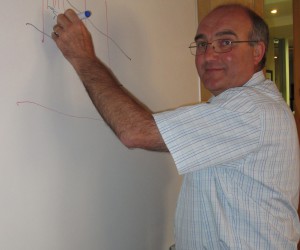As the mining sector finds itself increasingly short of experienced mechanical and electrical engineers, there is greater reliance on third-party consultants. But this is neither ideal nor sustainable, according to SRK Consulting's principal consultant, Steve Owen.
“When we look back at how the mining industries in countries like South Africa and Zambia were originally built, it is clear that there were solid engineering skills that created a sound foundation,” he said.
“The equipment employed by mines – particularly in complex deep-level operations like those found in SA’s gold sector – is often cutting-edge technology needing specialised skills to ensure proper installation, effective maintenance and safe functioning.”
Having come through a technical qualification, rather than directly into his university degrees, Owen appreciates the value of apprenticeship – a mode of learning that has been sadly neglected in recent decades.
His technical study went hand in hand with closely monitored on-the-job training to become a reliable artisan – a process that took four to five years. In many ways, the success of the mining industry in most countries was based on the competence and discipline of these experienced artisans, he added.
“You needed at least two years of postgraduate experience before you could take your SA Government Certificate of competency tests,” said Owen. “This might sound a long time, but there is no shortcut when lives are at stake. You just can’t fast-track this kind of learning; there is so much detail to be familiar with, and any poor decision can compromise safety.”
Imagine the responsibility on the mechanical and electrical departments of a deep gold mine, which draw as much energy as a city, he said. Working in an underground environment, with constant production pressure, adds to the danger posed by the smallest undetected fault.
“It is unfair to put inexperienced youngsters, even if they have university qualifications, straight into positions with this sort of responsibility,” said Owen. “Traditionally, it was the foreman and the general engineering supervisors – with their decades of experience – who could help ‘initiate’ young graduates into the working environment, ensuring there were no gaps in their knowledge. You can’t expect a young graduate to be working on electric switchgear, for example.”
SRK South Africa chairperson, Roger Dixon, highlighted the impact that this skills shortage is having, as the most experienced artisans have been reaching retirement age.
“When we are invited as consultants to some mining operations, we sometimes battle to find a qualified or experienced mechanical and electrical engineer on site,” said Dixon. “As mines become less profitable and these skills become more expensive, operations stretch their engineers over too wide an area of responsibility.”
Research commissioned by the department of labour recently repeated the complaint that “poor quality of mathematics and science education at school level” as well as the “general low quality of the school system” needed fixing before SA’s engineering skills could be boosted.
But Dixon emphasised the value of engineering apprenticeships in the mining sector, as the multi-skilled nature of mines made them an ideal training ground for young learners by exposing them to various technical demands.
“It is not enough to bemoan the demise of the apprenticeship system,” he said. “The mining sector needs to proactively pursue this kind of training approach, particularly drawing on the experience of older engineering personnel. We need to do this before they retire, or even draw them out of retirement if necessary.”
It is becoming increasingly clear that skills are a country’s best economic foundation, said Dixon, and Africa’s economies are fertile fields of opportunity for electrical and mechanical skills. SRK offers niche expertise in this regard, offering mining companies guidance and support when dealing with mine-specific engineering challenges.






